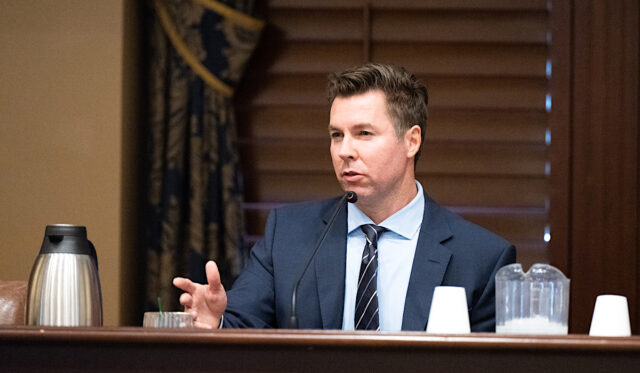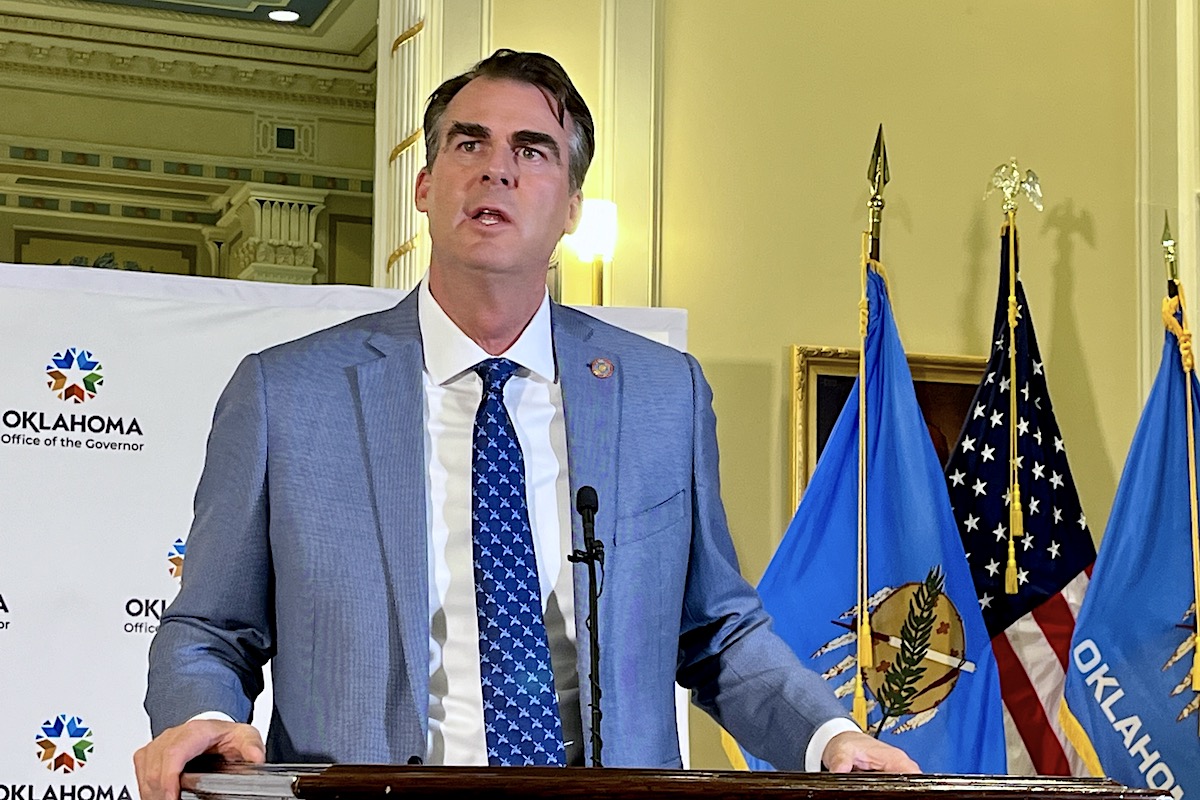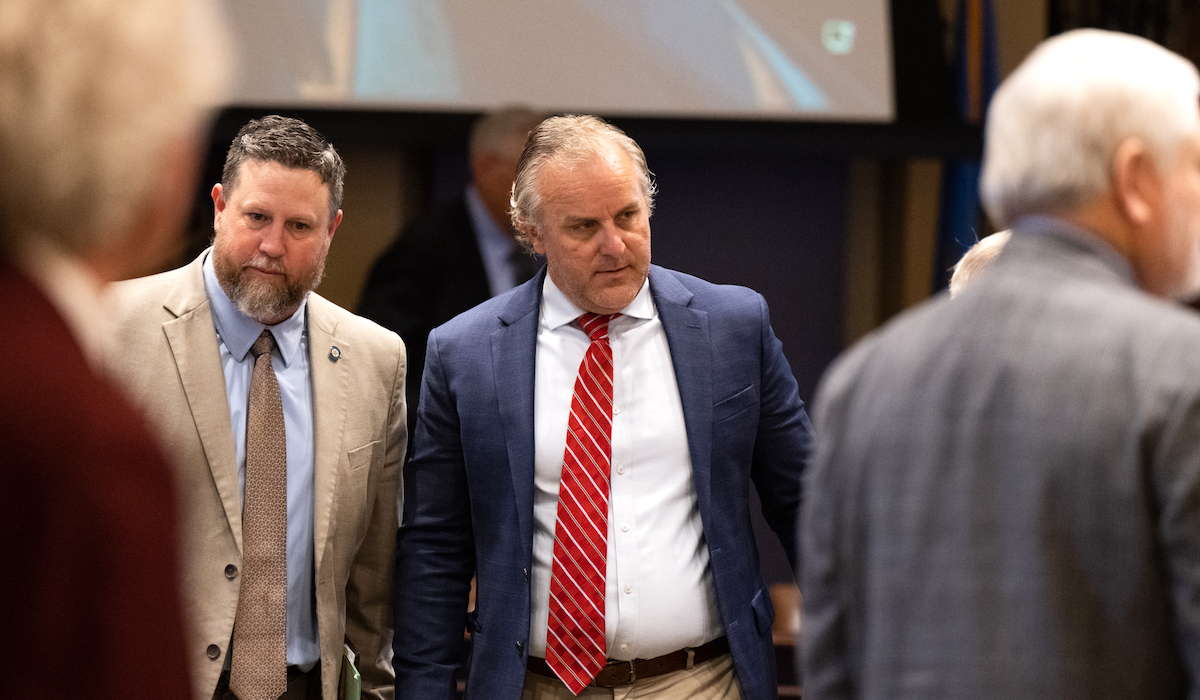

(Update: In the days following this article, Senate Bill 362 was passed into law, and the nominations of Clay McCall and David Echols were confirmed. The following article remains in its original form.)
With the two chambers of the Oklahoma Legislature reaching a budget deal Wednesday, hot political posturing and lingering animosity has transferred to remaining questions for a session set to end May 31: What will be done with policy bills and executive nominations?
On Friday, Gov. Kevin Stitt announced that his staff members have been told some of his pending appointees may not be confirmed by the Senate:
- Dr. Corey Finch (Cabinet secretary of health and mental health);
- Dr. Deborah Shropshire (Cabinet secretary of human services);
- Heather Turner (Department of Commerce director); and
- Leigh Gaddis (Wildlife Conservation Commission).
“It’s very hard to find and qualify and get the right Oklahomans to serve,” Stitt said. “There’s hundreds every year, and then we’re waiting until the very last week of session. I don’t know why you wouldn’t just start kind of doing the job all along the way. But here we are the last week of session, and we’ve got some great Oklahomans that may be fired from their jobs.”
Stitt also referenced a pair of appointees — Audrey Katigan (Department of Libraries Board) and Alex Gray (State Board of Education) — already viewed as rejected after their senator, Sen. Carri Hicks (D-OKC), called them “unqualified” April 16 and announced she would not support their nominations.
In the wake of Hicks’ announcement, several other education-related nominations went unscheduled well into May. A second State Board of Education appointee and three notable nominees with House of Representatives connections did not appear on the Senate Education Committee’s meeting agenda Tuesday, May 21:
- Zachary D. Archer (State Board of Education);
- Patrik Clay McCall (Murray State College Board of Regents);
- David Echols (Oklahoma City Community College Board of Regents); and
- Nellie Tayloe Sanders (secretary of education).
Surname scholars might recognize Clay McCall as the brother of House Speaker Charles McCall (R-Atoka) and David Echols as the father of House Majority Floor Leader Jon Echols (R-OKC). Both men, successful irrespective of their relatives’ political careers, have support from the two-year colleges they are set to serve. An accomplished attorney, David Echols has been proposed for a second seven-year term on the OCCC board. He was recently reelected as its chairman.
After Tuesday’s meeting, Senate Education Committee Chairman Adam Pugh said “we’ll see” when asked if he would hear the lingering education nominations. On Wednesday, legislators struck a budget agreement, and Pugh (R-Edmond) announced a new meeting for the final week of session. Along the way, a priority proposal for Pugh slid off high-center in a push for final floor votes.
On Thursday, when a Senate floor session had concluded, Pugh declined to discuss his decision making about the nominations of Clay McCall and David Echols.
“No comment,” Pugh said, ducking into the office of Senate President Pro Tempore Greg Treat (R-OKC).
When it was released 30 minutes later, Pugh’s May 28 committee agenda featured the names of Clay McCall, David Echols, Nellie Sanders and Zach Archer, as well as that of Ken Levit, executive director of the George Kaiser Family Foundation, whom Stitt has nominated to the State Regents for Higher Education.
On Wednesday — after the budget agreement but before Pugh scheduled the additional committee hearing — Treat said he had heard questions only recently about the pending considerations of his House counterparts’ family members.
“I try to empower my chairs to make good decisions,” Treat said. “I’ll have a conversation. I’ve been so caught up in the nitty-gritty of budget negotiations that I’ve trusted the chairs to do their job and vet (nominees). I’ve heard about those in the last 24 hours or so but haven’t had a chance to talk [about them].”
On Thursday — after Pugh had announced a meeting but before he had released its agenda — Treat said during a media availability that the Senate takes its duty to advise and consent seriously.
“I don’t anticipate any problems there,” Treat said when asked of David Echols and Nellie Sanders.
An advocate for dyslexia awareness with a background in nonprofit fundraising, Sanders is the spouse of former House Rep. Mike Sanders, whom Stitt supported for his current role as director of the Oklahoma Broadband Office.
Asked whether Pugh was using Clay McCall’s and David Echols’ nominations as leverage for the House to advance a bill stuck in the conference committee process, Treat said he was “not privy to those” conversations.
“Exec noms we take seriously on the Senate side — on vetting and making sure that we get it right. So we’ve denied some in the past for well-justified reasons,” Treat said. “On those, I have not heard any reason they were not qualified to do the positions for which they were nominated. I know that David Echols has been serving on the OCCC board with distinction for some time. I don’t really know Clay McCall. I’ve met him in passing, but I know he’s been on the school board there in Atoka for some time.”
Bullard: ‘I do not like personality politics’

While Pugh declined to discuss his calculations regarding the McCall and Echols nominations, other members of the Legislature noticed the dynamics at play.
Sen. David Bullard (R-Durant) is carrying Clay McCall’s nomination to the Murray State College Board of Regents. He said McCall, a banker like his brother, would be “perfect” for the position and would bring a financially “conservative” perspective to the board.
“I vetted Clay’s nomination before we announced it, and my assumption was after vetting it we weren’t going to have a problem,” Bullard said Tuesday. “But it looks like we have a problem, and I’m trying to still figure out what that is.”
Bullard said he suspected broader political machinations were holding up McCall’s consideration.
“I think the problem is going to become his last name, which is wrong,” Bullard said. “I do not like personality politics.”
Policy politics, however, have also been at play.
On Tuesday — the day before Pugh called the additional committee meeting — House leaders named members to the conference committee on Senate Bill 362, a 2023 measure amended April 25 in the House as a new variation of reforms to the Reading Sufficiency Act.
Both Pugh and House Common Education Committee Chairwoman Rhonda Baker (R-Yukon) have proposed stronger reading sufficiency standards, but Baker said they have disagreed over a funding component and an implementation timeline.
On Monday, Pugh and the Senate rejected Baker’s latest language in SB 362, which sent the bill to a conference committee. Word quickly spread that Pugh was leveraging his Senate committee’s executive nomination considerations in an effort to revive his preferences for the reading reforms.
“I’ve been wondering what is going on with this bill,” Baker said. “It’s been very curious to me what has really been going on.”
On Wednesday, Pugh’s preferences emerged in a Conference Committee Report for SB 362 around the same time he posted the additional meeting’s agenda.
“Pugh and I have always agreed in our policy that we’ve got to improve reading scores and literacy rates in Oklahoma. We’re in total agreement on that, but we disagreed somewhat on the implementation and the timeline on getting this policy in place,” Baker said Friday. “I think we should agree and get that legislation through regardless of something that has nothing to do with the legislation.”
Asked about the connection of reading requirement reforms with the nominations of Clay McCall and David Echols, Baker called it “sad.”
“These nominations have nothing to do with reading, and it’s frustrating that the powers that be in the Senate have decided they are going to use that as leverage to get back at somebody. And I’m in the middle. I don’t like that either,” Baker said. “I do know Pugh feels like he has been targeted by the House, because I have heard him say in the Capitol that he feels like anything that has his name on it is targeted. I can tell you that is not something I’ve ever heard anyone say.”
But Pugh has experienced his own bills stalling under the weight of frustrated House leaders before.
In the 2019 regular session’s biggest procedural derailment, Pugh was one of nine senators who unanimously voted down a bill prioritized by House Speaker Charles McCall that attempted to regulate how long a train could block a road. Some senators’ bills suddenly hit their own blockades, and Echols wondered aloud how any legislator could side with “train barons” over the citizens of Oklahoma.
Two days later, Treat brought the bill back up himself in a separate Senate committee and advanced it. HB 2472 briefly became law, but a federal judge ultimately ruled it unconstitutional, a primary factor for Pugh and other senators to vote against it originally.
Asked about this session’s conversations tying SB 362’s Reading Sufficiency Act reforms to Senate Education Committee confirmations, Treat said he was unaware of the dynamic.
“I’m not familiar with the conversations you’re talking about,” he said.
Other lawmakers involved in the situation — including Charles McCall and Jon Echols themselves — declined to comment. Senate Appropriations and Budget Vice Chairman Paul Rosino (R-OKC) is carrying David Echols’ nomination, but he also declined to discuss the situation.
Following a State Board of Education meeting Thursday, Superintendent of Public Instruction Ryan Walters was asked about Sanders’ and Archer’s pending nominations.
“The Senate, they have the ability to consent to them or not, and so they always do a great job with their due diligence. I went through those hearings before,” Walters said. “I know they’ve been in the process. I know that Archer has gone through a few meetings over there already. I know that Secretary Sanders has as well, so I think they’re smooth.”
In a statement Wednesday, Stitt emphasized that the proverbial nomination ball is in the Senate’s court.
“My job is just to find the very best Oklahomans with the best specialty and acumen in what they’re asked to do and lead. The Senate’s job is to confirm them — or there hopefully is a very good reason why you wouldn’t confirm someone,” Stitt said. “Hopefully the Senate will get them confirmed. They have until next Friday. So hopefully we get that done in the not-so-distant future.”
Stitt: Potential nominee rejections ‘really weird’

During his press conference Friday, Stitt focused on the nominations of Finch and Shropshire, a pair of medical doctors he said should be supported by the Senate.
“He is the first-ever African American secretary of health,” Stitt said of Finch before turning to Shropshire. “For her not to sit on my Cabinet to help me with these important topics is really weird.”
Stitt noted that Finch would become his second Cabinet secretary of health in a row to be rejected by the Senate. Last year, senators rejected Kevin Corbett’s confirmation during a late-night meeting in response to a barrage of Stitt vetoes.
This year, Stitt said he did not know whether Senate concern about Finch stemmed from his support for vetoing Senate Bill 458, a measure that would have expanded nurse practitioner prescriptive authority without physician oversight. Stitt axed the idea — a decades-long dispute among providers and legislators — in late March.
“I hope that’s not the case, because when we veto a bill, it’s all about what we think is right for Oklahoma. Dr. Finch was definitely opposed to that bill, as well as most other people in the medical profession, at least on the physician side,” Stitt said. “I thought it was a step too far (…) so he certainly advised me that was a bad bill. If that’s the reason they are going to fire him from his position, that’s odd, because he’s the best, most-qualified person for this position.”
Stitt also discussed Jenks Chamber of Commerce CEO Heather Turner, whom he nominated to be director of the Oklahoma Department of Commerce. Over the past year, the agency has been significantly gutted by the governor in an effort to change leadership and potentially restructure responsibilities.
“I believe the (Senate Business and Finance) Committee itself has some really serious concerns,” Treat said of Turner on Thursday.
Stitt praised Turner and said the Department of Commerce needs a strong leader amid ongoing “turmoil.”
“She’s been there about four weeks,” Stitt said. “I would hate to see her fired from that position.”
In response to Stitt’s comments Friday, Treat emphasized his body’s seriousness when it comes to Senate confirmations.
“We have already confirmed a good number of them, and I have personally carried some through the process,” Treat said in a statement. “Fully vetting each nominee takes time, and the Senate is doing its job as it has always done to meet this obligation.”
Treat in April: ‘Not going to stoop to that level’

When it comes to how Pugh has handled the pending nominations of Clay McCall and David Echols, it marks the second time legislative blood pressure has spiked this year over items involving family members.
In April, Treat alleged that McCall and Echols were playing politics with Senate Bill 2035, his primary policy proposal this year, which House Speaker-designee Kyle Hilbert (R-Bristow) amended to be named the Mason Treat Act.
Treat authored the bill after his son, Mason, and a deputy sheriff were injured when a truck crashed into them during a highway traffic stop. Mason Treat was driving legally, but he lacked a tag owing to convoluted vehicle-sale laws.
“I was given assurance by the speaker (and) others in the House that in no way, shape or form would they tie anything to that car-tag bill, and I found out yesterday that they had done just that the day before,” Treat said April 25. “I justifiably got upset with that and shared my opinion with the speaker, the speaker pro tem and the floor leader of the House.”
Despite House leaders insisting they had already sent the Mason Treat Act back to the Senate before following up about one of McCall’s own priorities, Treat said he initially directed his chamber to pull some House bills from consideration and not bring McCall’s House Bill 1105 to the Senate floor. Eventually, however, Treat changed his mind.
“I woke up this morning thinking, ‘Hey, that’s not who I am,'” Treat said. “I’m upset with the way the speaker played politics on something that he knows is that near and dear to me and important, but I’m not going to stoop to that level.”
Stitt signed the bill into law five days later.




















